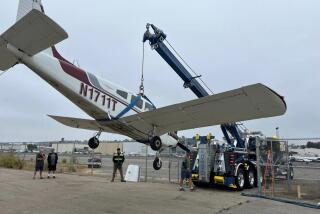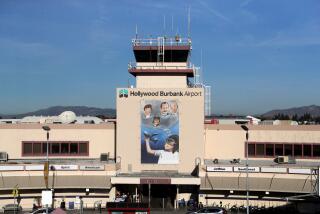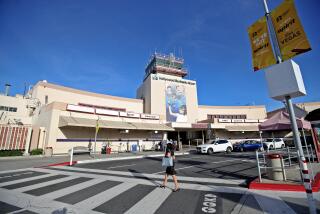Lack of Work Ends Drug Unit at Burbank Airport : Narcotics: After two months, only one arrest was made and less than an ounce of cocaine seized.
- Share via
The six-man narcotics unit haunted the terminals of Burbank Airport, blending into the flow of travelers who were passing through. The plainclothes investigators watched unnoticed, following the suspicious, the nervous--looking for the telltale signs of the drug courier or money launderer.
But after two months, it was the unit’s results that were almost unnoticeable: one arrest, less than an ounce of cocaine, nearly $50,000 in cash.
Officials said Monday that the multi-agency narcotics unit was disbanded last month because there just wasn’t enough drug business at the airport.
The investigators, assigned to the unit in April from five police agencies, were returned to their prior narcotics assignments after telling supervisors that there was not enough drug activity at the airport to justify their full-time status.
“There were six men out there and they just didn’t feel there were 40 hours of work apiece for them each week,” Burbank police Lt. Art Moody said. His department contributed two investigators and a narcotics-sniffing dog to the short-lived airport unit.
“There isn’t enough activity at the airport to justify it,” Moody said. “There is enough that we should spot-check it constantly. That’s what we will do.”
Officials said they believe the airport--which serves about 3.5 million passengers a year--is being used less by drug traffickers who increasingly are relying on ground transport to smuggle large shipments of drugs such as cocaine.
Lt. Don MacNeil, head of the Glendale police narcotics unit, which contributed one officer to the airport squad, said use of commercial transport centers by smugglers “fluctuates and wanes. Right now, we believe we are at a low point in activity at this airport.
“In the early and mid-’80s it was rather busy there,” MacNeil said. “Now it is diminishing activity. That isn’t to say we aren’t going to watch it. It just isn’t tactically worth our while. We thought our personnel would be better utilized” on other narcotics assignments.
In addition to the Burbank and Glendale police departments, the U.S. Customs Service and police departments from Pasadena and the airport contributed one investigator each to the unit.
The officers, described by MacNeil as “generic-looking individuals,” were veteran narcotics investigators who moved among passengers at the airport and used surveillance, profiling and other procedures to look for possible drug couriers. After a suspect was identified and extensively watched, the person was stopped and asked if investigators could search his baggage and other belongings.
During the two months of the unit’s operations, such stops were made daily but only one resulted in an arrest, officials said. Five other stops led to seizures of cash.
The arrest was of a man who was carrying less than an ounce of cocaine, officials said. The other five cases involved seizures--under federal civil procedures--of cash from travelers who could not properly account for its source. No arrests came from these cases.
The cash seizures, from $2,500 to $10,000 each, were believed to be profits from drug transactions. If federal courts rule that the seizures were proper, the money will be divided among the agencies contributing personnel to the airport unit, officials said.
Officials could not provide an estimated cost of the unit because each agency paid the expenses associated with its officers.
In attempting to analyze why drug-trafficking through the airport is apparently on the decline, MacNeil said that numerous large seizures of cocaine in Southern California in recent years indicate that traffickers are relying more on ground transportation.
One reason for this is that the declining price of cocaine in recent years has forced traffickers to smuggle larger quantities to make the same profits, he said. But smuggling on commercial airlines conflicts with this trend. He said it is primarily a small shipment method that is considered risky by smugglers because of the concentration of security at airports.
The higher risk for a lower profit means trafficking drugs through airports “is not as practical” anymore, MacNeil said.
Officials said the airport narcotics unit was experimental and that there is no disappointment in the decision to disband the unit. Airport Police Chief Anthony LoVerme said the unit’s office will remain open so it can be used by narcotics investigators when they return to conduct investigations.
“The level of activity never developed to what we thought might be there,” MacNeil said. “But for our peace of mind we had to do this. We have often wondered what it was like there. I think this assuaged the fears we had.”
More to Read
Sign up for Essential California
The most important California stories and recommendations in your inbox every morning.
You may occasionally receive promotional content from the Los Angeles Times.










